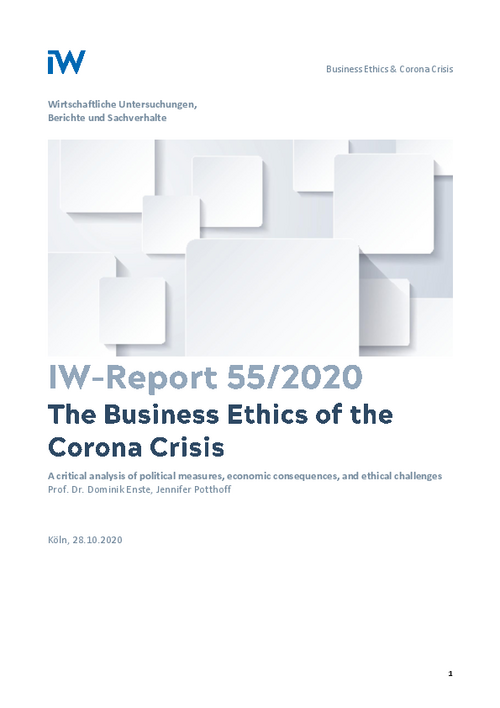This research work is intended to analyze the economic consequences and ethical challenges that are caused by the coronavirus pandemic and to predict whether one can find a balance within the arising conflict of interest between economy, health and ethics. The solution strategies of Germany, Sweden and South Korea will be compared in order to evaluate different types of crisis management and to finally derive possible lessons from the crisis.

The Business Ethics of the Corona Crisis
IW-Report

This research work is intended to analyze the economic consequences and ethical challenges that are caused by the coronavirus pandemic and to predict whether one can find a balance within the arising conflict of interest between economy, health and ethics. The solution strategies of Germany, Sweden and South Korea will be compared in order to evaluate different types of crisis management and to finally derive possible lessons from the crisis.
This work’s methodology is an analytical one and is primarily based on an analysis of most recently published economic studies and surveys as well as on an evaluation of literature such as most recent statements and publications of economic, ethical and medical – ethical institutions. The analysis has proven the multi - dimensionality of the crisis. Besides the grave macroeconomic consequences for the whole economy, depending on which industry is considered there are differences in the extent of the impact of the crisis which finally leads to losers and winners at the same time. In addition to the macro – and microeconomic damage, the social psychological consequences caused by the national lockdown of 2020 such as depressions and suicidality triggered by isolation and existential fears as well as the increase in domestic violence are equally important to mention. Overall, the measures taken from the government to contain the virus lead to a grave collateral damage and the pandemic causes ethical dilemmas both from a social – ethical and a medical – ethical level due to high restrictions of fundamental rights, an intervention in data privacy, the measures’ limitations with regard to the concept of equality of opportunities and the possibility of a triage situation. As a result of this multidimensional impact for different areas of interest, it is particularly important to involve a wide consensus of science into the decision – making process and to not only trust the virologists. In order to minimize the collateral damage of the crisis it is recommended to provide help and support for the social groups being most affected by the crisis and to apply economic and financial instruments such as short – time work and liquidity assistance in order to minimize the number of German insolvencies. However, as only a vaccine will provide a long – term solution, the central aim for the next months is to continue creating a new normality that reconciles the protection of people’s health, social and economic interests as effectively as possible in order to prevent deaths on the one hand and to keep the collateral damage of the crisis to the lowest possible level on the other hand.

Dominik Enste / Jennifer Potthoff: The Business Ethics of the Corona Crisis – A critical analysis of political measures, economic consequences, and ethical challenges
IW-Report

More on the topic

Behavioral Economics in Companies: Nudging green behavior
Climate change, the finite nature of natural resources, a growing world population and the quest for prosperity challenge society and policy to act responsibly and sustainably. The debate on climate change and the upcoming energy transition was recently ...
IW
Going Green with Behavioral Economics: How to Combine Business and Ethics
This paper calls for an increased discourse between Fridays for Future and representatives of business. Fridays for Future play a key role in educating the public and raising awareness of scientific reports, such as the Intergovernmental Panel on Climate ...
IW